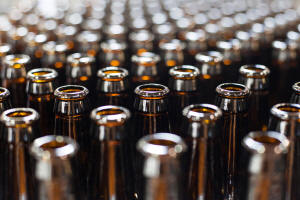Exclusive - Treasury wants to stir up U.S. alcohol market to help
smaller players
 Send a link to a friend
Send a link to a friend
 [February 09, 2022] By
Andrea Shalal and Diane Bartz [February 09, 2022] By
Andrea Shalal and Diane Bartz
WASHINGTON (Reuters) - The U.S. Treasury
Department on Wednesday flagged concerns about consolidation in the $250
billion annual U.S. alcohol market and outlined reforms it said could
boost competition and save consumers hundreds of millions of dollars
each year.
New merger and acquisition scrutiny, different tax rates and lifting
regulatory burdens to new entrants in the wine, beer and spirits market
would make the market fairer for new brewers and cheaper for consumers,
according to 63-page Treasury report.
The long-awaited report, due to be released later Wednesday, is part of
a July executive order on competitiveness and the latest push by the
Biden administration to fight what it calls excess consolidation in
industries from meatpacking to shipping.
The Treasury received over 800 public comments on the issue, then
suggested stiffer Department of Justice and Federal Trade Commission
oversight and new rule-making in the report, which was viewed by
Reuters.
The U.S. market for beer, wine and spirits has spawned thousands of new
breweries, wineries and distilleries over the past decade.

But a web of complicated state and federal regulations, some dating back
to the end of Prohibition in 1933, coupled with "exclusionary behavior"
by massive producers, distributors and retailers means small entrants
can struggle to compete and flourish, U.S. officials said.
The two largest brewers selling beer in the United States - Anheuser
Busch InBev and Molson Coors - account for 65% of U.S. beer revenues.
[to top of second column] |

A bunch of beer bottles wait to be filled and labeled ahead of
packaging at the Brooklyn Brewery in the Brooklyn borough of New
York, United States, March 9, 2015. REUTERS/Sara Hylton/File Photo

"We're determined to protect what has been a successful, vibrant industry with a
lot of small businesses entering it," while tackling issues that "lead to
excessive prices for consumers," said one senior U.S. official.
So-called "post and hold" laws, which restrict price competition, mean beer
consumers alone pay $487 million a year than they should, and can drive up the
cost of a bottle of wine by up to 18% and a bottle of spirits by over 30% the
report said, citing studies.
The DOJ and FTC, who share the work of antitrust enforcement, should take a
closer look at proposed acquisitions of smaller players by bigger ones, given
past claims that such deals would lower prices had failed to materialize,
Treasury said.
The report also called for the Treasury Department's Alcohol and Tobacco Tax and
Trade Bureau (TTB) to change labeling rules to protect public health and to
limit the impact of lobbying. As of 2017, alcohol companies reported 303
lobbyists in Washington.
U.S. states - which control the bulk of oversight - should examine the
anticompetitive impact of regulations and franchise rules on small producers,
Treasury said.
(Reporting by Andrea Shalal and Diane Bartz; Editing by Heather Timmons and
Aurora Ellis)
[© 2022 Thomson Reuters. All rights
reserved.]This material may not be published,
broadcast, rewritten or redistributed.
Thompson Reuters is solely responsible for this content.
 |